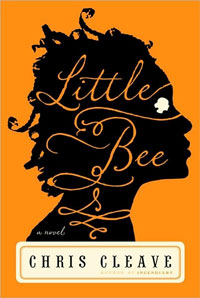|
| ||
| The biggest book of the year?
by Joe Foster Little Bee by Chris Cleave. Simon & Schuster, 2009. 266 pages I’ve been dying to write about this book since I read it a few weeks ago, but I’m unsure of how to do it. You see, the inside jacket flap (the part that tells you about the book, and tries to get you interested in reading it) says this: WE DON’T WANT TO TELL YOU TOO MUCH ABOUT THIS BOOK. It is a truly special story and we don’t want to spoil it. Nevertheless, you need to know something, so we will just say this: It is extremely funny, but the African beach scene is horrific. The story starts there, but the book doesn’t. And it’s what happens afterward that is most important. Once you have read it, you’ll want to tell everyone about it. When you do, please don’t tell them what happens either. The magic is in how it unfolds. That’s about it. In the interest of not spoiling the story for any future readers, I’m going to try to review this book without ruining it. I suppose that since I can’t tell you about the book, I’ll have to tell you about how it affected me. What else can we ask of a great story, really, than to be affected, if not even changed? So often, the great stories we’ve read, the stories that make us feel connected to the rest of the planet in ways we didn’t feel before, so often those stories are very simple. The effect that story has on us is not about the story itself, but about the writing, the ideas, the presentation. In Little Bee, the raw emotions stirred up and the horrific pain and sublime beauty are real and strong enough to hit like physical things. I found myself having to put the book down to pace and absorb what just happened, wanting to prolong the story, while at the same time wanting, needing, to see what happened next. I wept and laughed, every now and then both at the same time. As I’ve said before, I’m basically dead inside, so this is quite a feat. On top of all of this, the characters in Little Bee are tenderly drawn, their motivations complex and muddled enough to feel true. Really, who among us can’t claim the title of “walking contradiction?”I’ve seen comparisons to The Kite Runner, and while I can see why these comparisons are popping up, I have to say that, while I really like Khaled Hosseini, Chris Cleave is a much stronger writer. Comparatively speaking, though, there are similar moments of horror at our collective inhumanity, the confusion that comes from not truly understanding the world we’re reading about, and the soul-lifting moments so often tinged with overwhelming sadness. Both books are centered in parts of our world so troubled and dangerous as to seem unreal, but with another foot planted firmly here, in our relatively peaceful world. That contrast is, perhaps, the most troubling aspect of the story. I honestly feel that Little Bee is the next Kite Runner, in the way that it’s just a matter of time before it’s the book, the one that everyone’s read, that book that becomes the one that all similar newcomers are judged against. It’s slowly and quietly sweeping the country. So, without having really said anything about the book, I suppose all I can do is ask you to trust me. Little Bee is a book that will become enormous due to this concept of trust, a risky marketing idea that I find fascinating. We have to trust the publisher enough to buy the book, or you have to trust me, or whomever else tells you about it. The amount of trust we hold in people who recommend something to us is the deciding factor in whether or not we give a book a shot. The publisher might even be acting a little cocky about this one, trying to sell it without allowing people to know anything of its contents. That being said, I truly believe this is . I’m calling it now, three months in, with plenty of great books on their way. This one, though, will make the biggest splash. Pick it up, read it, and for crying out loud, keep your mouth shut. You don’t want to ruin it for your friends, do you? •
|
In this week's issue...
- December 18, 2025
- Let it snow
Although ski areas across the West have taken a hit, there’s still hope
- December 18, 2025
- Look, but don't take
Lessons in pottery theft – and remorse – from SW Colorado
- December 11, 2025
- Big plans
Whole Foods, 270 apartments could be coming to Durango Mall parcel


